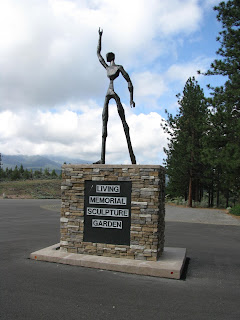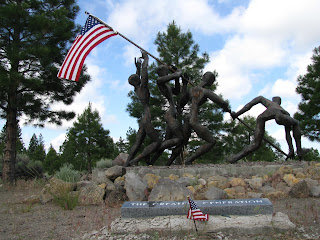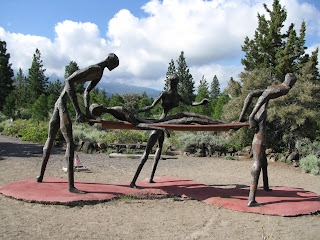Scripture readings: Isaiah
44:1-5; 1 Corinthians 3:1-23
 |
| Photos Taken June 2013: In and around Living Memorial Sculpture Garden; Near Weed, CA |
A Presbyterian preacher got a call from a lady who
was grieving over the death of her cat Homer. She wanted the minister to
conduct Homer’s funeral.
The minister explained that animal funerals were
just out of his line so he recommended that she call the Methodist preacher.
Later he learned that his Methodist friend had referred her to the Baptists,
who had referred her to the Pentecostals.
The next day, the woman called the Presbyterian back
and she was at her wits end, because none of the preachers in the area would
conduct Homer’s services. She was even willing to donate $5,000 to the church
of the minister who did the funeral.
It only took a moment for the preacher to make up
his mind. “Well, why didn’t you tell me, in the first place, that Homer was a
Presbyterian cat? Of course I’ll do his funeral” (James A. Lang, The Pastor’s
Story File, Nov. ’84)
I’ve never
done a cat funeral. If I did one, I would never ask for money. And it would
have to be a very simple funeral. Also, if I did a cat funeral, I would never
do it in the church because I think that most cats, like so many people I know,
wouldn’t be want to be caught dead in a church.
So, if the story about the cat funeral were true, I
would see it as an example of all the divisions in the people of Jesus only
serving as an excuse to keep from being what Jesus called his people to be. And
that is exactly what the divisions in the church were doing in Paul’s time.
 |
| Photos Taken June of 2013: In and around Living Memorial Sculpture Garden Weed, CA |
In Paul’s time there were no divisions that we would
call denominations. Technically, no one would have claimed to be separating
from the other Christians. They knew that would be a sin unless, maybe, the
other Christians were trying to kill them. But that wasn’t happening.
Toward the beginning of his letter, Paul mentions
these divisions, and he asks, “Is Christ divided?” (1 Corinthians 1:13) That
would shut them up! At least it would keep them from talking back to Paul, if
Paul were there.
They weren’t dividing the body of Christ. They were
only saying that they liked so-and-so best.
“I like Paul best!”
“You’re kidding! I like Apollos best! He a better
speaker by far! At least you can follow his sermons. You can tell he’s got an
outline; and it’s the easiest thing in the world to take notes when he
preaches. ”
“Apollos! That philosopher! What an egg-head! He’s
way too intellectual! I like Cephas best. Good old Peter: there’s no one more
down to earth than that old fisherman. And, beside, he’s the genuine article.
He really knew Jesus, and I feel like I’m right there with Jesus when I hear
him talk. He makes it all so real.”
The church
of Paul
 I was in a clique in high school. Once a week,
during lunch, I went to Chess Club. I hated chess, and I refused to play, but I
hung out there because that’s where my friends were, and we nodded our heads
when our science teacher complained about all the money spent on the footfall
program. “They ought to abolish football and spend it on science,” he would say.
I was in a clique in high school. Once a week,
during lunch, I went to Chess Club. I hated chess, and I refused to play, but I
hung out there because that’s where my friends were, and we nodded our heads
when our science teacher complained about all the money spent on the footfall
program. “They ought to abolish football and spend it on science,” he would say.
And so the business of liking so-and-so best becomes
the easiest way to think that you are better than other people. In the church
it means thinking you are better than other Christians.
My first church, after I was ordained, was on the Oregon
One Sunday, after worship, the Methodist minister’s
wife was talking to me about churches and she told me about whom she liked
best. She said, “I’m so proud to be a Methodist, we are thinking Christians.”
It made me wonder if she thought that we
Presbyterians were not thinkers. It also reminded me that Presbyterians would
have turned the expression around. I had always thought that it was the
Presbyterians who claimed to be the thinking Christians, as opposed to the ones
who didn’t think.
Paul believed
that such cliques were sins. Such cliques kept Christians from being all that
they could be. They always ended up defining themselves by whom and what they
were against just as much as by whom and what they were for.
Paul saw that wherever there was the spirit of “I
like so-and-so best” there was usually a deficiency in the Holy Spirit. Paul
saw that this thinking sucked Christians into “jealousy and quarreling”. (1
Corinthians 3:3) It was not of the Holy Spirit.

You can see this in congregations. You can see it
when new people come into a congregation and the established people want the
new people to take their side and join their click.
You can see this in denominational conflicts. Every
denomination has its cliques, and the cliques draw the lines for denominational
battles.
You can see this in how different denominations see
each other. Some stand up for the mind against the spirit. Others stand up for
the spirit against the mind. Or, if it isn’t the mind versus the spirit, the
cliques are about something else.
You can see this in the people who are so proud to
be nondenominational. Even the anti-clique is a clique.
I’m not proud of being a Presbyterian, because I
know what’s wrong with them. So I think I enjoy the safety of being in a clique
I am not proud of.
All I know is that I’m glad I’m not a Methodist! But
then, knowing how easy it is to be blind to our own sins, there is probably a
lot of Methodism in me. After all, I was born one, as the saying goes.
Paul saw the cliques in the Body of Christ as a form
of self-righteousness, and as a way to prove that they were smarter or more
spiritual than the others. Paul says, “Do not deceive yourselves. If any one of
you thinks he is wise by the standards of this age, he should become a fool so that
he may become wise.” (1 Corinthians 3:18)
 In the next chapter of his letter, Paul wrote how
the people in the cliques were congratulating themselves on how good it was to
be them. “Already you have all you want! Already you have become rich!” “We are
fools for Christ, but you are so wise in Christ! We are weak, but you are
strong! You are honored, we are dishonored!” (1 Corinthians 4:8, 10)
In the next chapter of his letter, Paul wrote how
the people in the cliques were congratulating themselves on how good it was to
be them. “Already you have all you want! Already you have become rich!” “We are
fools for Christ, but you are so wise in Christ! We are weak, but you are
strong! You are honored, we are dishonored!” (1 Corinthians 4:8, 10)
A strange process was going on, where the people in
most of the cliques looked at Paul, and Paul’s best friends, and saw that they
were always in some kind of trouble. The conventional wisdom told them that if
Paul had all that trouble and struggle, then he wasn’t a success, and God
wasn’t blessing him, and they would do well to like the other leaders best. Listening
to Paul might very well put them in the same boat as Paul.
Paul told them to expect his friend Timothy to
arrive soon. “He will remind you of my way of life in Christ Jesus, which
agrees with what I teach everywhere in every church.” (1 Corinthians 4:17) Paul
claimed to hold the patent to the anti-clique formula
Paul’s “way of life in Christ Jesus” was the way
Paul followed the one who died for his sins on the cross. Paul’s identity was
that of a person who had been “bought at a price” and no longer owned himself.
Does it sound odd to say this, when we think about
the importance of making choices about our life? Paul knew Christians who
created an identity for themselves by choosing who they would be and what they
liked best, and he also knew that they were (at the very same time) choosing a
way of life that wasn’t really “in Christ” at all.
A way that was not the “way of life in Christ” had
crept into their choosing who and what they liked best. That was the reason why
they were doing so well. That was why everyone approved of them. They liked
so-and-so best, and not Christ, and so they were living long, and prospering,
and keeping out of trouble. They were not choosing Christ alone, or Christ
above all else.
The so-and-so we like best, the so-and-so that defines
who we are, may not be a person or an organization at all. It might be about being
smart, or being spiritual, or being biblical, or being a survivor, or (in our
case, in Washtucna and Kahlotus, up to this time) being the only church. There
are ways in which we can make these into the center of our circle; and Christ
who takes away the sins of the world is not at the center of that circle.
The so-and-so we like best might be what some of the
people in Corinth
 Paul’s invitation to be a fool really tells us to
stop thinking about themselves as a clique, or falling in love with the idea of
creating a new identity of our very own. Later in this letter, Paul will say,
“You are not your own; you were bought at a price.” (1 Corinthians 6:19-20) In
Christ, our identity is not a matter of who we are, but whose we are.
Paul’s invitation to be a fool really tells us to
stop thinking about themselves as a clique, or falling in love with the idea of
creating a new identity of our very own. Later in this letter, Paul will say,
“You are not your own; you were bought at a price.” (1 Corinthians 6:19-20) In
Christ, our identity is not a matter of who we are, but whose we are.
A clique may be our version of “whose we are”. Our
clique, our people, may claim to own us, but only Jesus has actually bought us.
Jesus is the infinite God who paid an infinite price for us on the cross. When
you consider Jesus (when you truly see his wounds and scars) no one else can
truly own you.
Paul will ask, “What do you have that you did not
receive? And if you did receive it, why do you boast as though you did not?” (1
Corinthians 4:7) Paul wants his people to be thankful for being invited and
made into something much bigger (and yet much humbler) than a clique. “You are
God’s field, God’s building.” (1 Corinthians 3:9)
Paul told his people that it might not be the
“so-and-so” you like best that is responsible for working on you. God did the
choosing.
For years, when I was a kid, I had a minister who
hardly believed in anything. He didn’t really believe that Jesus was the Son of
God, or that Jesus died for our sins, or that Jesus rose from the dead.
I was eighteen before I really came to my senses
about this. Then I complained to the Lord about it, and the Lord told me that I
should listen anyway and there would always be something in what he said that
was the Lord’s message to me.
This goes way beyond whoever might be a leader or a
preacher. Just say that you are a fellow worker in God’s field and God’s house;
and God’s truth is that you are called to work on others, and they are called
to work on you. Pretend that all of you are entrusted with “the secret things
of God” for each other. (1 Corinthians 4:1)
In one way “the secret things of God” are simply the
great things of the cross that seem so foolish to so many people. They are only
secret things for those who have not met the Jesus of the cross. In another way
the secret things of God are the way God takes his most important things and
works them out in ways we cannot imagine.
In the secret things of God, how do you even know
what you are supposed to get out of anything? And if you don’t know what you
are supposed to get out of anything, then how do you know who it is that will
be the one to make it happen?
You are God’s field. You are God’s house. You and I
are like stalks of wheat, or stacks of lumber, or piles of stone; and just what
do we know about what God may be up to, and what people God may choose as the
ones he works through in our lives?
God’s gift to you may very well be the last person
you want to listen to, the last person you want to see; because this has so
much to do with pride and ego, and because God has so much to say about pride
and ego, and their danger.
Why not just know that you and I are fools? Let’s
wait and see what we will learn and how we will grow until God’s time for us
comes.
Paul wrote, “I do not even judge myself. My
conscience is clear, but that does not make me innocent. It is the Lord who
judges me. Therefore judge nothing before the appointed time; wait till the
Lord comes. He will bring to light what is hidden in darkness and will expose
the motives of men’s hearts. At that time each will receive his praise from
God.” (1 Corinthians 4:3-5)
 Who will teach us, who will build us, who will make
us grow? Really, in the end, it will be God working through the foolishness of
Jesus and his cross.
Who will teach us, who will build us, who will make
us grow? Really, in the end, it will be God working through the foolishness of
Jesus and his cross.
Only then will we even know who and what we are. In
the mystery of the gospel, the truth is that none of us truly knows who and
what we are.
God knows. And so our assumed identity, the very
thing we are most sensitive about (and value the most) is not the most valuable
thing about us at all. Our identity is not who we want to be. Our identity is
not who we think we are, but whose we are. And this is all wrapped up in the
mystery of Christ. We all belong to the hidden things of Christ who has been
crucified for us. We are Christ’s, “and Christ is God’s”.





No comments:
Post a Comment